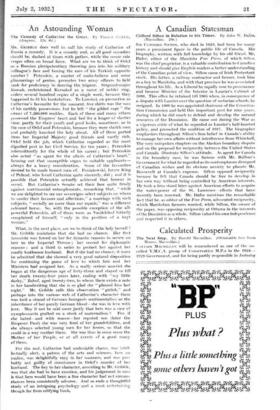Calculated Prosperity
The Next Step. By Harold Macmillan. (Obtainable free from Messrs. Macmillan.)
CAFTAIN MACMILLAN will be remembered as one of the so- called Y.M.C.A. group of Conservative M.P.s in the 1024- 199 Government, and for being partly responsible in Industry and the State for an attempt to outline a Conservative attitude more in keeping with modern conditions than that represented by the Party programme.
In the last few months Captain Macmillan has not been idle or inconspicuous. During the Tariff debates he was insistent in urging that the grant of duties should be made conditional on pledges of re-organization. Since then he has become generally associated with the conception of national planning. Now he has privately circulated for review and comment a memorandum of some twenty-four pages, in which he expounds the same idea at greater length, though still, of necessity, in general terms.
Although, unfortunately, the divisions which he makes in his subject matter are not adhered to consistently, Captain Macmillan may be said to reach conclusions under four heads. The first refers to a permanent, and the second to an immedi- ate, policy for the world as a whole ; the third to an immediate policy for Great Britain in default of world action ; the fourth to the mechanism by which, whether or not the world co- operates, Great Britain should attempt to carry out the part assigned to her. Postponing for the moment the first of these heads, we find that as immediate policies, reflation (restoration of prices to the 1928 level) is recommended for the world, and for Great Britain reflation combined with Protection (and various " plans " whose nature will be indicated later) ; while the mechanism of planning in Great Britain is to involve Repre- sentative National Councils for each industry and an Invest- ment and Development Board, representative of Government Industry and Finance for the country as a whole. There is nothing very startling here. The reflation proposals contain the admission that schemes perilously close to Government Works of a productive character may be necessary, if the increased credit is to be pumped into circulation. But this, coupled with Protection, has been semi-orthodox doctrine since the Keynes-M'Kenna addendum to the Macmillan Report last summer, and more surprise will be felt at the degree of Socialism to which the author has committed himself in his proposals for machinery. Taken as a whole the ideas here are scarcely novel, even if they are not usually thrown together in quite this way nor submitted by a Conservative Member of Parliament. Interest
would tend rather to settle on the general conception of a planned order which, though designed as a permanent. policy.
would apparently be added to the proposals already mentioned and applied immediately to England. On page 5 we read :
"I advance the proposition that prosperity is conditioned by equilibrium in production. If the forces of production are properly distributed in the production of consumption- goods in the right quantities and if the rate of saving is equalled by the rate of capital investment, then the total products will exchange against each other and prices and employment will be stable."
This is stimulating enough and we might well be prepared to overlook any bureaucracy involved if to the bald description of the aim were added a quasi-precise definition of the phrases used in describing it and a rough outline of the means required to attain it. But these are ji6t what are never vouchsafed to us, and we have no more idea on page 24 than we had on page 5 what steps in any given circumstances Captain Macmillan or his expert planners would take to achieve the desired equilibrium.
Every first year student of economics is aware that there is a certain proper" distribution of productive forces which will result in equilibrium, that in pure theory this equilibrium
will be achieved under laissez faire but that, for various reasons about whose nature there is as yet no certainty, things to-day
are not working out as theory would lead us to expect. Captain Macmillan has done little more than record an emphatic
personal opinion in favour of an attempt to repair by planning the failures of laissez faire. In what direction we are to look
for the " proper " distribution of productive force, and what meaning we are to attach to those hackneyed phrases "Saving and Investment "are the questions we are all asking and which Captain Macmillan virtually ignores. It may be mentioned in conclusion that he ignores also the broader question how far it is possible to displace the motive of profit and loss from determining the distribution of productive energy, and yet stop short of what is ordinarily called State Socialism.
Still those who want to be reminded what questions to ask themselves should certainly try to obtain a copy of Captain Macmillan's memorandum.







































 Previous page
Previous page